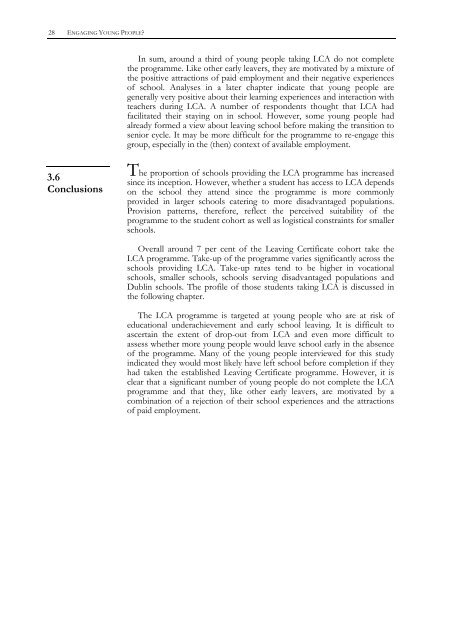Student Experiences of the Leaving Certificate Applied Programme
Student Experiences of the Leaving Certificate Applied Programme
Student Experiences of the Leaving Certificate Applied Programme
You also want an ePaper? Increase the reach of your titles
YUMPU automatically turns print PDFs into web optimized ePapers that Google loves.
28 ENGAGING YOUNG PEOPLE?In sum, around a third <strong>of</strong> young people taking LCA do not complete<strong>the</strong> programme. Like o<strong>the</strong>r early leavers, <strong>the</strong>y are motivated by a mixture <strong>of</strong><strong>the</strong> positive attractions <strong>of</strong> paid employment and <strong>the</strong>ir negative experiences<strong>of</strong> school. Analyses in a later chapter indicate that young people aregenerally very positive about <strong>the</strong>ir learning experiences and interaction withteachers during LCA. A number <strong>of</strong> respondents thought that LCA hadfacilitated <strong>the</strong>ir staying on in school. However, some young people hadalready formed a view about leaving school before making <strong>the</strong> transition tosenior cycle. It may be more difficult for <strong>the</strong> programme to re-engage thisgroup, especially in <strong>the</strong> (<strong>the</strong>n) context <strong>of</strong> available employment.3.6ConclusionsThe proportion <strong>of</strong> schools providing <strong>the</strong> LCA programme has increasedsince its inception. However, whe<strong>the</strong>r a student has access to LCA dependson <strong>the</strong> school <strong>the</strong>y attend since <strong>the</strong> programme is more commonlyprovided in larger schools catering to more disadvantaged populations.Provision patterns, <strong>the</strong>refore, reflect <strong>the</strong> perceived suitability <strong>of</strong> <strong>the</strong>programme to <strong>the</strong> student cohort as well as logistical constraints for smallerschools.Overall around 7 per cent <strong>of</strong> <strong>the</strong> <strong>Leaving</strong> <strong>Certificate</strong> cohort take <strong>the</strong>LCA programme. Take-up <strong>of</strong> <strong>the</strong> programme varies significantly across <strong>the</strong>schools providing LCA. Take-up rates tend to be higher in vocationalschools, smaller schools, schools serving disadvantaged populations andDublin schools. The pr<strong>of</strong>ile <strong>of</strong> those students taking LCA is discussed in<strong>the</strong> following chapter.The LCA programme is targeted at young people who are at risk <strong>of</strong>educational underachievement and early school leaving. It is difficult toascertain <strong>the</strong> extent <strong>of</strong> drop-out from LCA and even more difficult toassess whe<strong>the</strong>r more young people would leave school early in <strong>the</strong> absence<strong>of</strong> <strong>the</strong> programme. Many <strong>of</strong> <strong>the</strong> young people interviewed for this studyindicated <strong>the</strong>y would most likely have left school before completion if <strong>the</strong>yhad taken <strong>the</strong> established <strong>Leaving</strong> <strong>Certificate</strong> programme. However, it isclear that a significant number <strong>of</strong> young people do not complete <strong>the</strong> LCAprogramme and that <strong>the</strong>y, like o<strong>the</strong>r early leavers, are motivated by acombination <strong>of</strong> a rejection <strong>of</strong> <strong>the</strong>ir school experiences and <strong>the</strong> attractions<strong>of</strong> paid employment.

















